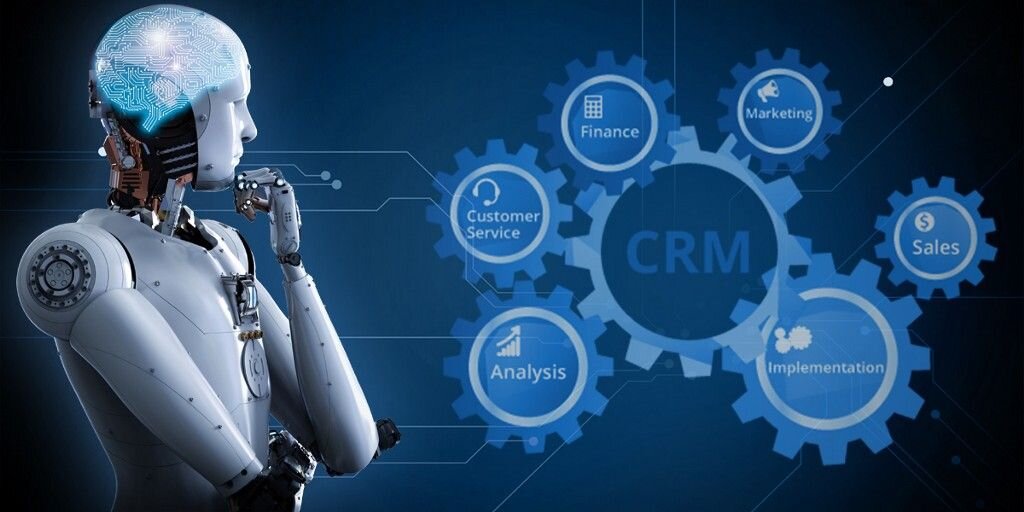What is artificial intelligence and why is it needed in marketing?
Artificial intelligence (AI) is a field of computer science that seeks to create computer systems that can perform tasks that require human intelligence. These systems are capable of data analysis, learning, self-training, pattern recognition, decision making, and more.
In marketing, artificial intelligence is widely used due to its ability to analyze large amounts of data, automate processes, and improve the efficiency of communication with clients. Here are some key aspects of the role of artificial intelligence in marketing:
1. Data Analysis and Forecasting: AI can analyze vast amounts of data faster and more efficiently than humans. This allows marketers to identify trends, predict consumer behavior, and optimize marketing campaigns.
2. Content personalization: Using AI, marketers can create personalized content that is tailored to the interests and needs of a specific user. This improves audience engagement and increases the likelihood of successful conversion.
3. Process automation: AI can automate many routine marketing tasks, such as sending emails, handling customer inquiries, analyzing website visitor data, and more. This frees up time and resources for more strategic tasks.
4. Demand Forecasting: and competitive analysis: AI helps predict demand for goods and services, analyze the competitive environment and identify new business opportunities.
5. Improving customer experience: AI enables companies to provide personalized customer service experiences, such as through chatbots or intelligent support systems.
Artificial intelligence is becoming an increasingly important tool in marketing, helping companies better understand their customers, improve their interactions with them, and increase the effectiveness of their marketing campaigns. As a result, it helps companies be more competitive and successful in the rapidly changing world of business.
Content: AI writes news and product cards
Artificial intelligence (AI) is becoming increasingly important in content creation, including news stories and product descriptions. This trend spans fields from journalism to e-commerce, and is bringing significant changes to the way content is created and consumed.
In the news sphere, AI is used to analyze huge amounts of data and automatically create articles. These systems are capable of not only summarizing information, but also generating texts that reflect key aspects of events. This approach ensures that the audience is promptly informed about various areas of life, from economics to sports.
In e-commerce, AI is used to create product descriptions based on their features and images. This helps e-commerce stores present their products more effectively and attractively to potential buyers.
One of the main advantages of using AI in content creation is its ability to personalize. Algorithms can adapt content to the preferences and interests of each user, making it more attractive and relevant.
Moreover, AI is capable analyze trends and forecast demand, which helps companies adapt their content and marketing strategies to changing market needs.
Despite all the advantages, it is important to remember that the human factor remains no less important. Artificial intelligence can create texts, but it is not always able to capture the subtleties of style and emotional aspects that make content attractive to the audience. Therefore, the optimal use of AI requires combining it with human creativity and editing. This symbiosis allows you to create high-quality and attractive content that can effectively interact with the audience.
Selection of relevant offers: multiple increase in conversion
Подбор релевантных предложений — ключевой элемент успешного маркетинга, поскольку он напрямую влияет на конверсию и уровень удовлетворенности клиентов. Когда предложения соответствуют потребностям и интересам аудитории, вероятность успешной продажи значительно возрастает.
An example of effective use of relevant offer matching is Amazon. This internet giant uses machine learning algorithms to analyze previous purchases and customer behavior to suggest products that might interest them. For example, if you bought a vegan cookbook, Amazon will suggest you other books on this topic or kitchen tools that match your interests.
Another example is Netflix, which uses data about viewer preferences to recommend movies and TV series. Using data analysis algorithms, Netflix offers viewers content that is most likely to interest them based on their previous views and ratings.
The benefits of selecting relevant offers are obvious.
Firstly, this helps reduce the time and resources spent on analyzing data and making decisions about marketing campaigns.
Secondly, this increases marketing effectiveness because customers only see the offers that best suit their needs, increasing the likelihood of their acceptance.
In addition, the selection of relevant offers helps improve the user experience. Customers feel that the company understands their needs and takes into account their individual preferences, which increases their level of trust and loyalty to the brand.
Using data to tailor relevant offers allows businesses to achieve exponential conversion growth and improve the overall results of their marketing efforts. It is an effective tool that allows businesses to stay ahead of the digital marketing curve and compete effectively in the market.
Virtual assistants and chatbots: automated communication with clients
Virtual assistants and chatbots are modern tools that allow companies to automate the process of communication with customers and improve the quality of service. They are used in various industries, from retail to financial services, and are becoming increasingly popular due to their efficiency and convenience.
An example of a virtual assistant is Apple's Siri or Google Assistant. They provide the user with a wide range of services, from executing voice commands to searching for information on the Internet. These virtual assistants are trained to recognize and adapt to the individual preferences of users, which makes them very convenient to use.
Chatbots, on the other hand, are used to automate customer interactions on websites, apps, and messengers. They can answer frequently asked questions, provide information about products and services, and help solve problems. An example of successful use of chatbots is in the banking sector, where they help customers with bank account transactions, transfers, and credit transactions, which improves the customer experience and reduces the workload on contact centers.

One example of the use of chatbots is «Domino’s Pizza», which provides its customers with the ability to order pizza via Facebook Messenger. Users can select dishes, specify the delivery address, and pay for the order without leaving the messenger app. This simplifies the ordering process and makes it more convenient for customers.
Другой пример — чат-бот «Sephora Virtual Artist», which helps shoppers choose cosmetics by applying virtual makeup to their photos. This allows customers to test products and make more informed purchasing decisions, which helps increase conversions and improve the shopping experience.
Overall, virtual assistants and chatbots are powerful tools for automating customer communication and improving customer service. Their successful use can significantly improve business efficiency and improve interaction with the audience.
Advertising and targeting: AI manages the campaign instead of a specialist
Advertising and targeting are being revolutionized by the use of artificial intelligence (AI). Today, AI is able to effectively manage advertising campaigns, making decisions and optimizing strategies much faster and more accurately than humans.
An example of the successful application of AI in advertising and targeting is the platform Facebook Ads. Facebook uses machine learning algorithms to analyze millions of data points about user behavior, preferences, and interests. This allows it to automatically optimize advertising campaigns, select the most appropriate audience and optimal time to display ads, and optimize advertising budgets to achieve maximum conversion.

Another example is Google Ads, where AI is used to optimize advertising campaigns on the Google Search Network. AI algorithms analyze user behavior, their queries, page context, and other factors to determine which ads will be most relevant to a specific user query. This helps advertisers achieve higher campaign performance and improve ROI.
It is also worth mentioning advertising platforms such as Amazon Advertising and Yandex.Direct, which also use AI for targeted advertising. These platforms allow advertisers to customize advertising campaigns based on the interests and preferences of specific users, as well as conduct a thorough analysis of advertising performance for further optimization.
Using AI in advertising and targeting not only increases the effectiveness of advertising campaigns, but also saves advertisers time and resources. Thanks to AI’s ability to adapt to changing trends and market conditions, it provides more accurate and relevant targeting, which leads to increased conversion and improved advertising campaign results in general.
Does Your Business Need AI?
Artificial intelligence (AI) is becoming an increasingly important tool for modern businesses. The question of whether your business needs AI is becoming increasingly relevant, as it can significantly improve efficiency, streamline processes, and create a competitive advantage. Let's look at a few key aspects of why AI may be important for your business

1. Process automation: AI can automate many routine tasks and operations, freeing up time and resources for more strategic and creative tasks. For example, AI can automate data processing, warehouse management, customer service, and more.
2. Data Analysis and Forecasting: AI has the unique ability to analyze large amounts of data and identify hidden patterns, trends, and relationships. This allows your business to make more accurate forecasts, make informed decisions, and adapt to changing market conditions.
3. Personalization: AI helps create personalized offers, products, and services for each customer based on their preferences, purchase history, and behavior. This improves the customer experience, increases loyalty, and increases the likelihood of repeat purchases.
4. Improving Marketing Strategies: AI can optimize marketing campaigns, predict consumer behavior, determine the most effective promotion channels, and personalize content for the target audience.
5. Improving production processes: In manufacturing, AI can optimize inventory management processes, improve product quality, reduce equipment maintenance costs, and predict potential failures.
In the end, the question of whether your business needs AI has a clear answer: yes, it can significantly improve the efficiency of your business, optimize processes and create a competitive advantage in the market. The use of AI is becoming increasingly necessary as it helps businesses stay ahead of the competition and successfully adapt to the rapidly changing business environment.








